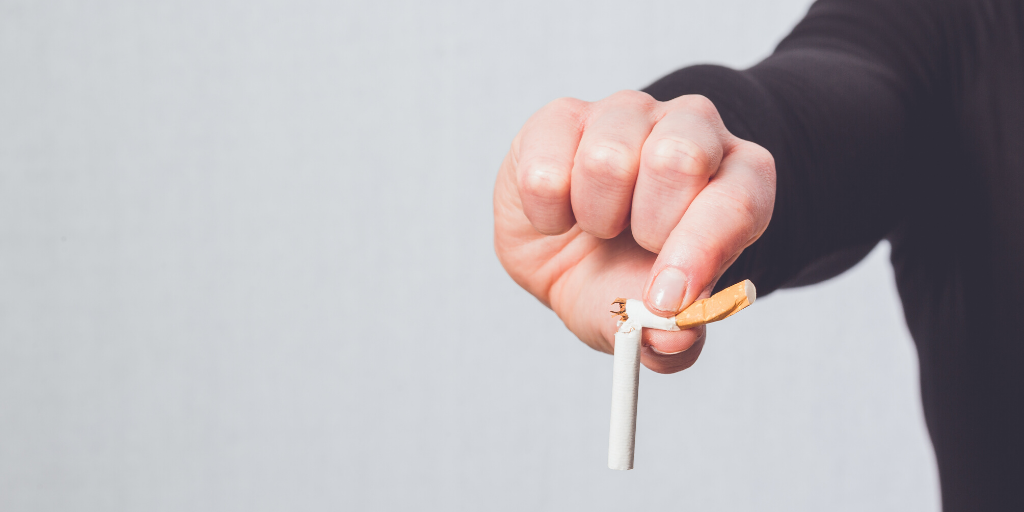
There are many health benefits to quitting smoking. No matter how long or how much a person has smoked, quitting can ALWAYS improve health.
- Reduce risk of heart attack. Smoking lowers good cholesterol (HDL), which is important to preventing plaque buildup in the arteries that give oxygen to the heart and DOUBLES the risk of heart disease. Quitting can improve HDL and reduce risk of coronary heart disease over time.
- Reduce risk of stroke. Smoking changes blood vessels, which makes blood clots and stroke more likely. Quitting will allow the body to reverse artery damage and reduce risk of stroke over time.
- Reduce risk of lung cancer. Cigarettes contain carcinogens, which cause damage to cells and can lead to lung cancer. Cigarette smoking causes close to 90% of cases of lung cancer. Quitting smoking can allow the lungs to heal and prevents further damage.
- Reduce risk of chronic bronchitis and emphysema. Smoking can cause permanent changes to the lungs, which cause difficulty breathing – sometimes requiring treatment with daily medications, and in severe cases, requiring oxygen. Quitting cannot reverse permanent changes, but will reduce the progression of the changes and may prevent the need for medications or oxygen therapy.
- Lower blood pressure. Smoking causes high blood pressure.
- Improve sense of smell and taste. Cigarettes damage nerve endings responsible for smell and taste. Quitting can improve these senses in as quickly as a few days.
- Improve exercise tolerance. Smoking causes lung irritation that can cause cough and shortness of breath. Quitting allows for better breathing and more endurance.
- Fewer wrinkles! Smoking ages the skin and causes wrinkles.
How quickly does my body recover after quitting?
In one year after quitting smoking, a person’s risk for coronary heart disease decreases by about half. In 15 years, it will return to the same risk as a nonsmoker.
In 10 years after quitting smoking, a person’s chances of developing lung cancer are about half of that of a person who continues to smoke. In 20 years, the risks reduce to that of a nonsmoker.
What therapies are available to help me quit?
Medications
- Nicotine replacement products like nicotine gum and nicotine patches reduce the body’s cravings for nicotine, an addictive chemical found in cigarettes.
- Bupropion (also known as Zyban and Wellbutrin) is a prescription medication that can reduce the desire to smoke.
- Varenicline (also known as Chantix and Champix) is a prescription medication that can reduce the desire to smoke and reduce withdrawal symptoms.
Some nicotine products are available over the counter. Talk with your doctor about whether you might be a good candidate for other therapies.
Non-medical therapies
- Exercise. Good endorphins can help prevent cravings.
- Stay away from smokers and places that you associate with smoking. Avoid triggering a craving.
- Use sugar-free gum or candy to replace cigarettes.
- Eat something healthy with a crunch, such as celery or carrots, to reduce stress.
- Wait five minutes. The craving for a cigarette peaks at three to five minutes, so if you wait, it will reduce on its own. During this time, you can walk, meditate, get a drink of water, call a friend or review your reasons for quitting.
How do I quit?
S = Set a quit date. Pick a quit date two to four weeks out and stick to it! Whether you wean down cigarettes until then or abruptly stop, a quit date provides a goal.
T = Talk to your doctor. See if you are a good candidate for therapies to help you stop smoking for good.
O = Obtain support from family and friends. Maybe a friend also needs to quit.
P = Plan ahead. Remove all tobacco products from your home and office. Avoid triggers that may cause you to smoke. Come up with strategies to help reduce cravings.
If you have any questions or concerns about quitting smoking, please contact us to learn more.

